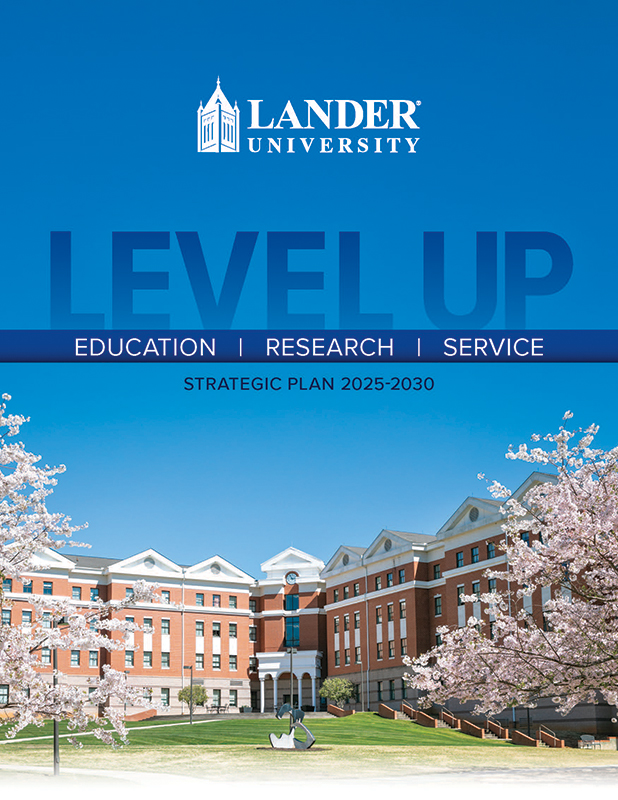Vision
All Lander University graduates are broadly educated, well-informed, equipped for responsible participation in the civic lives of their communities and prepared to continue their education or launch their careers.
Mission
Lander University offers high-demand and market-driven programs to ambitious and talented students in South Carolina and beyond. These programs are delivered in a rich liberal arts environment to produce highly qualified and marketable graduates.
Strategic Plan
 2025 Lander University Strategic Plan (PDF)
2025 Lander University Strategic Plan (PDF)
2025 Lander University Strategic Plan (Issuu)
Iterative input from members of the Lander community including faculty and staff, students, alumni, donors, legislators and university boards yielded a total of 22 potential strategic pillars. Further evaluation and deliberation resulted in the following six key pillars:
1. Academic Excellence in Teaching, Scholarship, and Service
Provide a supportive environment that fosters academic excellence through a teacher-scholar model. This model ensures effective teaching, explorative and creative activities, research and service to our community. Through strategic and philanthropic investments, these areas of focus ensure that Lander will always remain distinctive and relevant.
1.1 Expand experiential learning, active learning, and career skills with a focus on workforce development outcomes.
1.2 Clarify institutional expectations and support for faculty professional development activities, as distinct from scholarship, that inform faculty alignment of instruction with the needs of current students and with emerging technologies.
1.3 Increase the quality and frequency of scholarship and research by tenured and tenure-track faculty.
1.4 Document the participation of Lander University faculty in activities that provide service to the community.
1.5 Maintain administrative and organizational structures in Academic Affairs that promote excellence and sustainability of academic programs.
1.6 With institutional and advancement support, ensure state of the art facilities to support excellence in instruction and academic support.
1.7 Provide faculty support for scholarships and research through endowed chairs, professorships, and fellowships.
2. Student Success
Create an educational environment that fosters forward progress of all Lander students, designed to achieve a measurable increase in retention and graduation rates. Develop graduates who are broadly educated and prepared to continue their education or launch their careers as valuable, influential members of the workforce.
2.1 Provide innovative holistic pathways to improve academic retention outcomes through scholarship and unrestricted philanthropic support.
2.2 Strengthen belonging with higher levels of engagement along student experience pathways.
2.3 Enhance student navigation for 6-year graduation pathways.
3. Share The Lander Story
Successfully articulate the value of Lander University to faculty and staff, current students, future students, parents, alumni, donors, K-12 educators, and elected officials.
3.1 Hire an experienced executive to provide vision, strategy, and oversight for all marketing and communications functions at the university.
3.2 Establish and uphold a comprehensive brand identity system and standards of content creation.
3.3 Raise the profile of Lander University across South Carolina and the Southeast.
3.4 Implement data-driven marketing and analytics
3.5 Redesign www.lander.edu and conduct a university-wide content audit.
4. Create a University Culture and Environment of Continuous Improvement
Utilize the talent and resources of the university to maximize the efficient use of facilities, financial resources, and human capital to achieve Lander University’s mission.
4.1 Implement process reviews in key operational areas.
4.2 Create an Innovation Grant Program for faculty and staff.
4.3 Develop a robust professional development ecosystem.
4.4 Launch a facilities and space optimization initiative.
4.5 Strengthen budget transparency and resource alignment.
4.6 Modernize and expand campus infrastructure.
5. Develop the SCIPSC Institute
Establish the South Carolina Institute on the Prevention of Sexual Violence on College Campuses to reduce the prevalence of interpersonal violence on college campuses in South Carolina through a collaborative, unified approach.
5.1 Strengthen collaboration among South Carolina colleges and universities through prevention.
5.2 Establish a South Carolina Sexual Violence Prevention Grant for colleges and universities.
5.3 Expand multitiered education and awareness of sexual violence.
5.4 Develop an annual report to capture state-wide prevention efforts.
5.5 Mobilize advocacy and support through an online presence.
6. Data Readiness Framework
Develop a comprehensive data readiness framework that ensures high-quality, readily accessible data to support decision-making and comply with all external reporting requirements. Data will be well-governed, interoperable, and traceable, enabling advanced analytics, reliable reporting, and operational efficiency.
6.1 Data Quality: Establish and maintain high-quality, accurate, and consistent data across all university systems.
6.2 Data Availability: Ensure timely access to relevant data for authorized users across the university.
6.3 Interoperability: Enable seamless data exchange and integration between different university systems and external partners.
6.4 Data Provenance: Maintain comprehensive documentation of data sources, transformations, and usage throughout its lifecycle.
Mission approved by the Faculty on March 16, 2016.
Mission approved by the Board of Trustees on March 22, 2016.
Mission approved by the CHE on June 2, 2016.
Vision revised and approved by Board of Trustees on September 14, 2021.
Pillars approved by the Board of Trustees on December 12, 2024.
 2025 Lander University Strategic Plan (PDF)
2025 Lander University Strategic Plan (PDF)